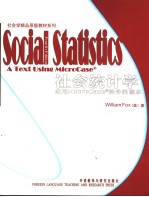图书介绍
社会统计学:应用MicroCase软件的课本【2025|PDF下载-Epub版本|mobi电子书|kindle百度云盘下载】

- (美)福克斯(Fox,W.)著 著
- 出版社: 北京:外语教学与研究出版社
- ISBN:7560045588
- 出版时间:2004
- 标注页数:342页
- 文件大小:102MB
- 文件页数:40094246页
- 主题词:社会统计-应用软件,MicroCase-高等学校-教材-英文
PDF下载
下载说明
社会统计学:应用MicroCase软件的课本PDF格式电子书版下载
下载的文件为RAR压缩包。需要使用解压软件进行解压得到PDF格式图书。建议使用BT下载工具Free Download Manager进行下载,简称FDM(免费,没有广告,支持多平台)。本站资源全部打包为BT种子。所以需要使用专业的BT下载软件进行下载。如BitComet qBittorrent uTorrent等BT下载工具。迅雷目前由于本站不是热门资源。不推荐使用!后期资源热门了。安装了迅雷也可以迅雷进行下载!
(文件页数 要大于 标注页数,上中下等多册电子书除外)
注意:本站所有压缩包均有解压码: 点击下载压缩包解压工具
图书目录
Part Ⅰ Introduction and Univariate Analyses1
Chapter 1 Statistics and Variables3
1.1 Statistics and Data4
1.2 Overview of Statistics5
1.3 Samples and Populations6
1.4 Variables8
1.5 Levels of Measurement9
1.6 Mutually Exclusive and Collectively Exhaustive14
1.7 Continuous and Discrete Variables15
1.8 What Cases, Variables, and Data Files Look Like16
1.9 Aggregate Data18
1.10 Ideas and Thinking20
1.11 Playing with Data22
1.12 Summing Up Chapter 122
Chapter 2 Frequency and Percentage Distributions27
2.1 Frequency Distributions28
2.2 Percentage Distributions31
2.3 Cumulative Distributions34
2.4 Creating Sensible and Well-Formatted Tables36
2.5 Collapsing Variables38
2.6 Excluding Missing Data42
2.7 Selecting Subsets of Cases45
2.8 Pie Charts and Bar Graphs45
2.9 Outliers48
2.10 Mapping Ecological Variables49
2.11 Summing Up Chapter 251
Writing Statistics 1: Percentages Distributions, Graphs, and Maps55
Chapter 3 Averages61
3.1 Mode62
3.2 Median63
3.3 Mean66
3.4 Properties of the Mean68
3.5 The Mean for Dichotomous Variables70
3.6 Which to Use—Mode, Median, or Mean?72
3.7 Summing Up Chapter 375
Chapter 4 Measures of Variation79
4.1 Variances and Standard Deviations80
4.2 Shapes of Distributions87
4.3 Standard Scores (Z-Scores)89
4.4 Normal Distributions91
4.5 Sampling Distributions94
4.6 Confidence Intervals98
4.7 Some Cautions Using Univariate Statistics100
4.8 Summing Up Chapter 4102
Writing Statistics 2: Averages and Standard Deviations105
Part Ⅱ Bivariate Analyses107
Chapter 5 Cross-tabulation109
5.1 Bivariate Frequency Tables110
5.2 Bivariate Percentage Tables113
5.3 How to Read Percentage Tables116
5.4 Positive, Negative, and Curvilinear Relationships118
5.5 Format Conventions for Bivariate Tables122
5.6 Stacked Bar Graphs for Bivariate Relationships125
5.7 A Caution About Bivariate Tables Based on Small Ns126
5.8 Association Does Not Imply Causation127
5.9 Summing Up Chapter 5129
Chapter 6 The Chi-Square Test of Statistical Significance133
6.1 The Logic of Tests of Statistical Significance134
6.2 The Chi-Square Test137
6.3 Problems with Expected Frequencies Less Than 5144
6.4 Statistical Significance Does Not Mean Substantive Significance145
6.5 Significance Tests on Population Data147
6.6 Summing Up Chapter 6147
Chapter 7 Measures of Association for Cross-tabulations151
7.1 Overview of Measures of Association152
7.2 Chi-Square-Based Measures for Nominal Variables V and φ152
7.3 Lambda155
7.4 Choosing a Nominal Measure of Association158
7.5 Measures of Association for Ordinal Variables: Gamma159
7.6 Somers' DYX164
7.7 Measures of Association: An Overview168
7.8 Summing Up Chapter 7169
Writing Statistics 3: Bivariate Cross-tabulations172
Chapter 8 Comparison of Means and t Test175
8.1 Box-and-Whiskers Diagrams/Differences Between Means176
8.2 t Test for the Difference Between Means179
8.3 Assumptions and Cautions Concerning t Test186
8.4 One-Tailed and Two-Tailed Tests188
8.5 Confidence Intervals for Differences Between Means190
8.6 Summing Up Chapter 8192
Writing Statistics 4: Comparison of Means and t Test195
Chapter 9 Analysis of Variance197
9.1 Box-and-Whiskers Diagrams/Differences Among Means198
9.2 Purpose and Assumptions of Analysis of Variance201
9.3 The Logic of Analysis of Variance202
9.4 The ANOVA Table211
9.5 The Correlation Ratio (E2)211
9.6 Two-Way Analysis of Variance (and Beyond)213
9.7 Three Cautions About Statistically Significant F Ratios214
9.8 Summing Up Chapter 9215
Writing Statistics 5: Analysis of Variance218
Chapter 10 Regression and Correlation221
10.1 Scatterplots222
10.2 Scatterplots and the Strength of Relationships225
10.3 Some Limitations of Scatterplots228
10.4 Regression and Least-Squares Lines229
10.5 Calculating Regression Coefficients233
10.6 Correlation Coefficient (r)234
10.7 r2 as Proportion of Variation Explamed239
10.8 Correlations Between Dichotomous Variables241
10.9 Association Still Does Not Imply Causation242
10.10 Linear and Nonlinear Relationships242
10.11 Test of Significance for a Correlation Coefficient243
10.12 Correlation Matrix245
10.13 Summing Up Chapter 10247
Writing Statistics 6: Regression and Correlation251
Part Ⅲ Multivariate Analyses253
Chapter 11 Multivariate Cross-tabulation255
11.1 The Logic of Causal Relationships256
11.2 Spurious Relationships258
11.3 Some Terminology261
11.4 Examples of Spurious Relationships262
11.5 Replication263
11.6 Somewhere Between Explanation and Replication264
11.7 Specification265
11.8 Suppressor Variables266
11.9 Controlling for an Intervening Variable269
11.10 Partial Gamma271
11.11 An Overview of Elaboration272
11.12 Elaboration and Problems of Small Ns273
11.13 The Relationship of Multivariate Analysis to Experiment Design274
11.14 Summing Up Chapter 11276
Writing Statistics 7: Multivariate Cross-tabulation279
Chapter 12 Multiple Regression and Correlation281
12.1 Extending the Regression Model281
12.2 Multiple Correlation Coefficient287
12.3 Standardized Regression Coefficients (Beta Coefficients)289
12.4 Significance Tests for Multiple Correlation Coefficients291
12.5 Regression with Dichotomous and Dummy Variables292
12.6 Summing Up Chapter 12295
Writing Statistics 8: Multiple Regression and Correlation299
Appendix Statistical Tables301
Table 1: The Chi-Square Distribution303
Table 2: The t Distribution304
Table 3A: The F Distribution: p = .05305
Table 3B: The F Distribution: p = .01306
Table 3C: The F Distribution: p = .001307
Glossary309
Bibliography325
Index329
热门推荐
- 2290132.html
- 3077148.html
- 1980900.html
- 1202149.html
- 2945056.html
- 3893902.html
- 2065711.html
- 292684.html
- 1537454.html
- 921927.html
- http://www.ickdjs.cc/book_168302.html
- http://www.ickdjs.cc/book_1449093.html
- http://www.ickdjs.cc/book_251533.html
- http://www.ickdjs.cc/book_2050073.html
- http://www.ickdjs.cc/book_1615138.html
- http://www.ickdjs.cc/book_97342.html
- http://www.ickdjs.cc/book_2105252.html
- http://www.ickdjs.cc/book_2509701.html
- http://www.ickdjs.cc/book_1333624.html
- http://www.ickdjs.cc/book_634500.html